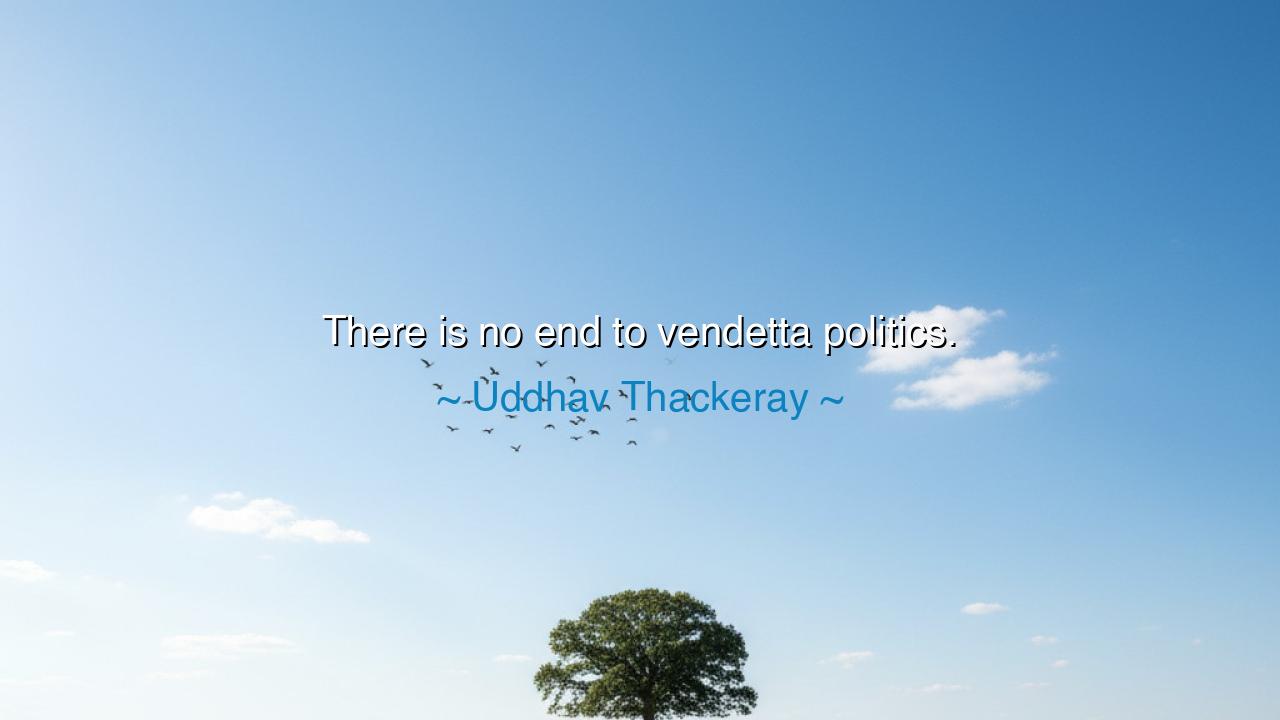
There is no end to vendetta politics.






When Uddhav Thackeray declared, “There is no end to vendetta politics,” he gave voice to an ancient sorrow: the endless cycle of rivalry and revenge that devours nations and corrodes the hearts of leaders. For politics, when consumed by vendetta, ceases to be the art of service and becomes instead a battlefield of grudges, where personal enmity is dressed in the garments of statecraft. In such wars, it is not only rulers who suffer, but the people, for they become pawns in a struggle that knows no peace.
The ancients spoke often of this curse. In the tragedies of Greece, vendetta was the chain that bound entire families to destruction—the House of Atreus, where blood answered blood, and revenge birthed only more revenge. The chorus wept at the futility of it, knowing that vengeance never ends of its own will, but only through mercy or wisdom. Thackeray’s words echo this ancient refrain: that in the realm of politics, as in myth, vendetta feeds upon itself, never satisfied, always demanding more.
History, too, provides its lessons. In Renaissance Italy, the feuds between powerful houses like the Medici and their rivals painted the streets of Florence with intrigue and blood. Each strike was met with a counterstrike, each exile with a return, until the very stability of the republic was shattered. Though centuries apart, the pattern remains unchanged: when leaders place personal revenge above the common good, the state becomes a stage for endless strife.
Yet Thackeray’s lament is more than despair; it is also a warning to the living. By naming this truth, he calls future generations to recognize the trap. For if there is “no end” to vendetta politics, it is because those who practice it do not choose to end it. The cycle may be ancient, but it is not inevitable. To break it requires courage greater than vengeance: the courage to forgive, to reconcile, and to put the welfare of the people above the hunger for retribution.
So let this teaching endure: beware the poison of vendetta. It promises justice but delivers only ruin. In the hands of rulers, it is a fire that burns the state from within; in the lives of common people, it is a chain that binds generations. True strength lies not in perpetuating the feud, but in ending it. For while there may be no end to vendetta politics as long as pride reigns, there is an end if wisdom and mercy are chosen. And only then can a nation breathe free from the smoke of endless strife.






BCtran huu bao chau
It’s troubling that vendetta politics can seem endless, but I wonder if there are any political leaders or movements that manage to break this cycle. Can political systems ever evolve beyond the pettiness of personal grudges, or are these conflicts simply a part of human nature? What would it take to change the mindset of those who view politics as a battlefield of personal vendettas instead of a platform for progress?
PV41-Hoang Thi Phuong Vy
Uddhav Thackeray’s words seem to reflect the deep-rooted nature of political rivalries. But are these vendettas just a result of individual egos, or are they more about maintaining power dynamics? When politicians get caught in vendettas, do they lose sight of what really matters, like serving the people? How can we encourage more integrity and collaboration in politics, where people put aside grudges for the common good?
TTDo Tran Tien
The idea that there’s no end to vendetta politics feels exhausting, but is it entirely accurate? Sure, political feuds seem to linger, but could there be a way to break free from this endless cycle? Is it always about vendettas, or do some political leaders genuinely seek progress and unity? If the focus shifts from personal grudges to policy and long-term solutions, could we move past this toxic culture?
KANguyen Thi Kim Anh
Uddhav Thackeray's statement about vendetta politics seems spot on. It feels like politics can often become a cycle of retaliation, where past grievances never truly fade, but just fuel future conflicts. Can this endless back-and-forth be broken? Is it even possible to move beyond vendetta-driven politics, or do those in power find it easier to perpetuate these divisions for their own benefit? How can we shift the focus to constructive politics instead of personal vendettas?